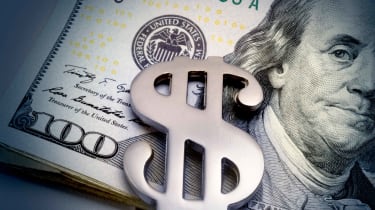Foreign Stocks & Emerging Markets
The greenback’s rise may hurt companies with a global footprint, but benefit those that depend on imports.A strong dollar is a thorn in the side of U.S companies with a global footprint. Revenues earned overseas translate into fewer greenbacks here when the dollar is strengthening. And U.S. products become increasingly pricey for consumers abroad. Over the past year, the dollar is up more than 14% against a basket of foreign currencies, as measured by the U.S. Dollar Index (DXY). And if inflation stays high, more rate-hiking from the Federal Reserve to cool the economy and tame prices would likely push the dollar even higher.
That has started to put a dent into U.S. corporate profits.
During the second quarter earnings season companies including Johnson & Johnson (JNJ), IBM (IBM), Microsoft (MSFT), Netflix (NFLX) and Salesforce.com (CRM) have trimmed their outlooks for business results because of a beefier buck. Companies in the benchmark S&P 500 index generate about 30% of their revenues outside the U.S. according to investment firm LPL Financial. “We estimate that currency took perhaps 2 to 2.5 percentage points out of S&P 500 revenue in the second quarter,” says Jeff Buchbinder, chief equity strategist for LPL.
Emerging markets securities typically take a hit when the dollar climbs because many of those nation’s corporate and government bonds are denominated in dollars, says Buchbinder, making it harder to service that debt. They might also pay more for commodities such as oil, which are priced in dollars. For the year ending July 29, the MSCI Emerging Markets index (IEMG) is down more than 20%.
Strong-dollar winners include U.S businesses that rely on imports, and therefore will see some cost relief as their dollar goes further, says Mitch Zacks, portfolio manager at Zacks Investment Management. U.S. companies that garner the lion’s share of revenues domestically, including many small-company stocks and utilities, can do well when the dollar is rising. And of course, U.S. consumers, especially anyone planning a vacation abroad, can stretch the value of the dollar in terms of both traveling costs and buying goods and services abroad.
But Zacks cautions investors from giving the dollar too much weight in making broad tactical portfolio decisions. He notes that the stock market has done well in both strong- and weak-dollar periods, broadly speaking. A rising dollar coincided with one of the best periods for U.S, stocks, from 1995 to 2000, when the S&P 500 index returned more than 21% annualized. It was also on the rise during the brutal 2008 bear market. Conversely, a generally weakening dollar during 2003-2006 corresponded with a relatively strong market.
